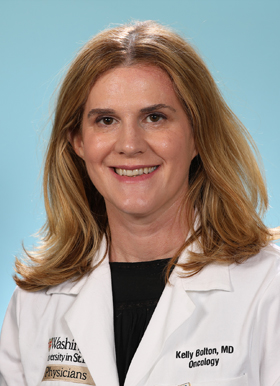Kelly Bolton, MD, PhD, physician-scientist at Washington University School of Medicine, is the recent recipient of The Women Scientists Innovation Award for Cancer Research.

The V Foundation for Cancer Research, a premier cancer research charity, recently announced the first recipients of A Grant of Her Own: The Women Scientists Innovation Award for Cancer Research. Eleven researchers were chosen to receive grants in a move to progress cancer research while challenging gender disparities.
These outstanding scientists deserve recognition and support for the groundbreaking research being conducted. Outside of applauding their accomplishments, this inaugural class signals the V Foundation’s commitment to challenging the status quo, Susanna F. Greer, PhD, and the V Foundation’s Chief Scientific Officer stated. Through these grants, we are not only advancing vital cancer research, but we are working to encourage more women to pursue careers in science.
Susanna F. Greer, PhD
V Foundation extended a three year $600,000 award for her work in developing a therapeutic strategy to prevent myeloid neoplasms. Dr. Bolton has focused her career on investigating genetic predisposition to cancer with an emphasis on hematologic blood malignancies such as leukemia. Her research revolves around people who are at risk of developing cancer based on genetic variants they have inherited from their parents as well as variants they have acquired during their lifetime.
Bolton has her own research group and is under the mentorship of Matthew Walter, MD, a member of the Specialized Program of Research Excellence (SPORE) in Leukemia. Most of Dr. Bolton’s day is spent in her lab on data analysis, which she does independently and with her trainees. They use computational approaches in patient cohorts to understand how genetic variation leads people to develop cancer and how environmental factors change that response. Many of her projects focus on how acquired mutations in the blood clonal hematopoieses or CH, lead to the development of hematologic cancers.
She also has a patient care clinic, working with patients who have either inherited susceptibility to cancer or CH. She and her team assess these patients for their risk of developing cancers and monitor them over time. (Spore In Touch, 2022)
For those who have inherited genetic variants from their parents (called germline genetic variants) that put them at risk for cancer, Dr. Bolton often treats multiple people in the same family as they share that risk.

“I have some families that are multigenerational. It’s rewarding on a personal level, because I really get to know the entire family,” says Dr. Bolton. “What’s also interesting is how the same genetic variant causes different types of cancers and imparts different risks of cancer in one person to another, and we don’t really know why, so that’s part of my research — trying to understand how these risk variants interact with other factors about the person to determine how likely they are to develop cancer.”
Kelly Bolton, MD, PhD
Assistant Professor of Medicine
Dr. Bolton shares that it’s been shown that as you age people develop mutations all over their bodies and its thought developing these mutations with age is a pre-cursor for cancer. When you develop a mutation in a stem cell in your bone marrow that is called clonal hematopoiesis which can led to hematologic cancers. The focus in the Bolton lab trying to understand the factors that lead to the progression of clonal hematopoiesis (CH).

Bolton lab has recently identified that a type of CDK4/6 inhibitor, called Trilaciclib, might show promise as a treatment for CH. Her lab has analyzed data from clinical trials in patients receiving a type of CDK4/6 inhibitor that is used in conjunction with chemotherapy to prevent low blood counts. The goal of chemotherapy for a solid tumor like lung or breast cancer, is to target and kill cancer cells. However, normal cells are also impacted including the stem cells in the bone marrow that make blood cells. In previous work, Dr. Bolton’s group has shown that chemotherapy-induced damage to hematopoietic stem cells can cause CH to expand, impacting a larger number of blood cells and increasing the risk of progression to hematologic cancer. Trilaciclib has been shown to protect bone marrow stem cells from chemotherapy-induced damage. Thus, Dr. Bolton hypothesized that CDK46 inhibitors might prevent CH from expanding in people receiving chemotherapy.
Dr. Bolton offers, “We thought maybe CDK4/6 inhibitors might prevent chemotherapy-induced CH expansion. We sequenced patient samples before and after chemotherapy in patients receiving concurrent CDK4/6 inhibition compared to placebo. We were able to show that those who received the CDK4/6 inhibitor had a suppression of CH. Based on that we wanted to sequence additional samples and are looking at a mirroring in a mouse-model so we can understand whether you see a similar effect or a dampening over time.”
Dr. Bolton shares that her clinical work is being done in collaboration Omar Abdel-Wahab, MD at MSK and the plan is to use the V Foundation award funds to develop this idea further to see if CDK46 inhibitors might be a useful preventative strategy in people with high-risk forms of clonal hematopoiesis. For more Information about this initiative and other V Foundation grant programs visit the V Foundation website.
Cited sources: Washington University (2022, September 1). Kelly Bolton, MD, PhD. Spore In Touch. Retrieved August 2, 2023